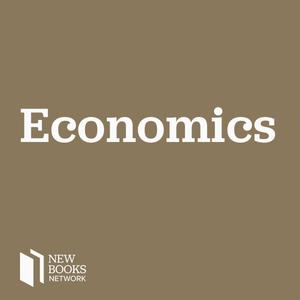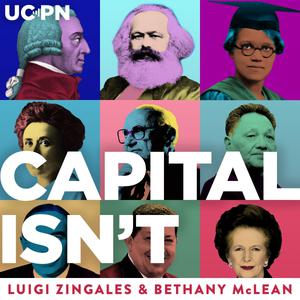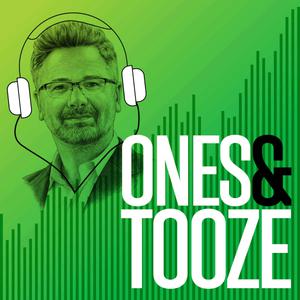
New Books in Economics
Interviews with Economists about their New Books
- 1 hour 3 minutesCéline Bessière and Sibylle Gollac, "The Gender of Capital: How Families Perpetuate Wealth Inequality" (Harvard UP, 2023)
In many countries, property law grants equal rights to men and women. Why, then, do women still accumulate less wealth than men? Combining quantitative, ethnographic, and archival research, The Gender of Capital: How Families Perpetuate Wealth Inequality (Harvard UP, 2023) explains how and why, in every class of society, women are economically disadvantaged with respect to their husbands, fathers, and brothers. The reasons lie with the unfair economic arrangements that play out in divorce proceedings, estate planning, and other crucial situations where law and family life intersect.
Céline Bessière and Sibylle Gollac argue that, whatever the law intends, too many outcomes are imprinted with unthought sexism. In private decisions, old habits die hard: families continue to allocate resources disproportionately to benefit boys and men. Meanwhile, the legal profession remains in thrall to assumptions that reinforce gender inequality. Bessière and Gollac marshal a range of economic data documenting these biases. They also examine scores of family histories and interview family members, lawyers, and notaries to identify the accounting tricks that tip the scales in favor of men.
Women across the class spectrum—from poor single mothers to MacKenzie Scott, ex-wife of Amazon billionaire Jeff Bezos—can face systematic economic disadvantages in divorce cases. The same is true in matters of inheritance and succession in family-owned businesses. Moreover, these disadvantages perpetuate broader social disparities beyond gender inequality. As Bessière and Gollac make clear, the appropriation of capital by men has helped to secure the rigid hierarchies of contemporary class society itself.
Céline Bessière is Professor of Sociology at the University of Paris-Dauphine.
Sibylle Gollac is a researcher in sociology at the National Centre for Scientific Research.
Morteza Hajizadeh is a Ph.D. graduate in English from the University of Auckland in New Zealand. His research interests are Cultural Studies; Critical Theory; Environmental History; Medieval (Intellectual) History; Gothic Studies; 18th and 19th Century British Literature. YouTube channel. Twitter.
Learn more about your ad choices. Visit megaphone.fm/adchoices
Support our show by becoming a premium member! https://newbooksnetwork.supportingcast.fm/economics
3 May 2024, 8:00 am - 47 minutes 47 secondsJohn J. Berger, "Solving the Climate Crisis: Frontline Reports from the Race to Save the Earth" (Seven Stories Press, 2023)
Solving the Climate Crisis: Frontline Reports from the Race to Save the Earth (Seven Stories Press, 2023) is a hopeful and critical resource that makes a convincing and detailed case that there is a path forward to save our environment. Illustrating the power of committed individuals and the necessity for collaborative government and private-sector climate action, the book focuses on three essential areas:
- The technological dimension move to 100% clean renewable energy as fast as we possibly can through innovations like clean-steel, "green" cement, and carbon-reuse companies;
- The ecological dimension enhance and protect natural ecosystems, forests, and agricultural lands to safely store greenhouse gases and restore soils, transforming how we grow, process, and consume food;
- The social dimension update and create new laws, policies and economic measures to recenter human values and reduce environmental and social injustice.
Based on more than 6 years of research, Berger traveled the nation and abroad to interview governors, mayors, ranchers, scientists, engineers, business leaders, energy experts, and financiers as well as carbon farmers, solar and wind innovators, forest protectors, non-profit leaders, and activists.
With real world examples, an explanation of cutting-edge technologies in solar and wind, and political organizing tactics, Solving the Climate Crisis provides a practical road map for how we effectively combat climate change. Replacing the fossil-fuel system with a newly invigorated, modernized, clean-energy economy will produce tens of millions of new jobs and save trillions of dollars. Protecting the climate is thus potentially the greatest economic opportunity of our time.
Learn more about your ad choices. Visit megaphone.fm/adchoices
Support our show by becoming a premium member! https://newbooksnetwork.supportingcast.fm/economics
3 May 2024, 8:00 am - 40 minutes 40 secondsAllison Schrager, "An Economist Walks Into A Brothel And Other Unexpected Places to Understand Risk" (Portfolio, 2019)
Whether you are a commuter weighing options of taking the bus vs walking to get you to work on time or a military general leading troops into war, risk is something we deal with every day. Even the most cautious of us can’t opt out—the question is always which risks to take to maximize our results. But how do we know which path is correct? Enter Allison Schrager. Schrager is not a typical economist. Like others, she has spent her career assessing risk, but instead of crunching numbers or sitting at a desk, she chose to venture out. Now, she travels to unexpected places to uncover how financial principles can be used to navigate hazards and prevent danger. In her new book An Economist Walks Into A Brothel And Other Unexpected Places to Understand Risk (Portfolio, 2019), Schrager puts together a five-pronged approach for understanding and assessing risk. First, she helps define what risk and reward mean for individuals. Then, taking into account irrationality and uncertainty, Schrager helps readers master their domains and ultimately get the biggest bang for what she calls the “risk buck.” While there are certain factors that cannot be predicted, An Economist Walks Into A Brothelmarries financial economics with real life examples to provide a road map, offer concrete advice, and maximize payoff.
Learn more about your ad choices. Visit megaphone.fm/adchoices
Support our show by becoming a premium member! https://newbooksnetwork.supportingcast.fm/economics
30 April 2024, 9:00 am - 46 minutes 24 secondsAdia Harvey Wingfield, "Gray Areas: How the Way We Work Perpetuates Racism and What We Can Do to Fix It" (Amistad Press, 2023)
Labor and race have shared a complex, interconnected history in America. For decades, key aspects of work—from getting a job to workplace norms to advancement and mobility—ignored and failed Black people. While explicit discrimination no longer occurs, and organizations make internal and public pledges to honor and achieve “diversity,” inequities persist through what Dr. Adia Harvey Wingfield calls the “gray areas:” the relationships, networks, and cultural dynamics integral to companies that are now more important than ever. The reality is that Black employees are less likely to be hired, stall out at middle levels, and rarely progress to senior leadership positions.
Dr. Wingfield has spent a decade examining inequality in the workplace, interviewing over two hundred Black subjects across professions about their work lives. In Gray Areas: How the Way We Work Perpetuates Racism and What We Can Do to Fix It (Amistad Press, 2023), she introduces seven of them: Alex, a worker in the gig economy Max, an emergency medicine doctor; Constance, a chemical engineer; Brian, a filmmaker; Amalia, a journalist; Darren, a corporate vice president; and Kevin, who works for a nonprofit.
In this accessible and important antiracist work, Dr. Wingfield chronicles their experiences and blends them with history and surprising data that starkly show how old models of work are outdated and detrimental. She demonstrates the scope and breadth of gray areas and offers key insights and suggestions for how they can be fixed, including shifting hiring practices to include Black workers; rethinking organizational cultures to centralize Black employees’ experience; and establishing pathways that move capable Black candidates into leadership roles. These reforms would create workplaces that reflect America’s increasingly diverse population—professionals whose needs organizations today are ill-prepared to meet.
It’s time to prepare for a truly equitable, multiracial future and move our culture forward. To do so, we must address the gray areas in our workspaces today. This definitive work shows us how.
This interview was conducted by Dr. Miranda Melcher whose new book focuses on post-conflict military integration, understanding treaty negotiation and implementation in civil war contexts, with qualitative analysis of the Angolan and Mozambican civil wars.
Learn more about your ad choices. Visit megaphone.fm/adchoices
Support our show by becoming a premium member! https://newbooksnetwork.supportingcast.fm/economics
30 April 2024, 8:00 am - 1 hour 7 minutesGeorge R. Boyer, "The Winding Road to the Welfare State: Economic Insecurity and Social Welfare Policy in Britain" (Princeton UP, 2019)
The creation of the postwar welfare state in Great Britain did not represent the logical progression of governmental policy over a period of generations. As George R. Boyer details in The Winding Road to the Welfare State: Economic Insecurity and Social Welfare Policy in Britain (Princeton University Press, 2019), it only emerged after decades of different legislative responses to the problems of poverty that reflected shifting societal attitudes on the subject. As Boyer explains, welfare policy in the early 19th century primarily consisted of cash or in-kind payments provided for people living in their homes. This changed with the Poor Law Amendment Act of 1834, which replaced it with the infamous workhouse system. Though this brought down expenditures on the poor, the expectation that poverty was being reduced was belied by a series of reports at the end of the century which exposed the extent of urban poverty to a shocked nation. In response, the Liberal governments of the early 20th century passed a series of laws that established unemployment insurance and pensions for the elderly. While these expanded considerably the role of the state in providing for the poor, Boyer demonstrates that they fell well short of a comprehensive system, one which William Beveridge detailed in a famous 1942 report that served as the blueprint for the legislation passed by the Labour government after the Second World War.
Learn more about your ad choices. Visit megaphone.fm/adchoices
Support our show by becoming a premium member! https://newbooksnetwork.supportingcast.fm/economics
29 April 2024, 8:00 am - 53 minutes 40 secondsMichael De Groot, "Disruption: The Global Economic Shocks of the 1970s and the End of the Cold War" (Cornell UP, 2024)
In Disruption: The Global Economic Shocks of the 1970s and the End of the Cold War (Cornell University Press, 2024), Dr. Michael De Groot argues that the global economic upheaval of the 1970s was decisive in ending the Cold War. Both the West and the Soviet bloc struggled with the slowdown of economic growth; chaos in the international monetary system; inflation; shocks in the commodities markets; and the emergence of offshore financial markets. The superpowers had previously disseminated resources to their allies to enhance their own national security, but the disappearance of postwar conditions during the 1970s forced Washington and Moscow to choose between promoting their own economic interests and supporting their partners in Europe and Asia.
Dr. de Groot shows that new unexpected macroeconomic imbalances in global capitalism sustained the West during the following decade. Rather than a creditor nation and net exporter, as it had been during the postwar period, the United States became a net importer of capital and goods during the 1980s that helped fund public spending, stimulated economic activity, and lubricated the private sector. The United States could now live beyond its means and continue waging the Cold War, and its allies benefited from access to the booming US market and the strengthened US military umbrella. As Disruption demonstrates, a new symbiotic economic architecture powered the West, but the Eastern European regimes increasingly became a burden to the Soviet Union. They were drowning in debt, and the Kremlin no longer had the resources to rescue them.
This interview was conducted by Dr. Miranda Melcher whose new book focuses on post-conflict military integration, understanding treaty negotiation and implementation in civil war contexts, with qualitative analysis of the Angolan and Mozambican civil wars.
Learn more about your ad choices. Visit megaphone.fm/adchoices
Support our show by becoming a premium member! https://newbooksnetwork.supportingcast.fm/economics
28 April 2024, 8:00 am - 38 minutes 21 secondsJohn L. Sullivan, "Podcasting in a Platform Age: From an Amateur to a Professional Medium" (Bloomsbury, 2024)
Podcasting in a Platform Age: From an Amateur to a Professional Medium (Bloomsbury, 2024) explores the transition underway in podcasting by considering how the influx of legacy and new media interest in the medium is injecting professional and corporate logics into what had been largely an amateur media form.
Many of the most high-profile podcasts today, however, are produced by highly-skilled media professionals, some of whom are employees of media corporations. Legacy radio and new media platform giants like Google, Apple, Amazon, and Spotify are also making big (and expensive) moves in the medium by acquiring content producers and hosting platforms. This book focuses on three major aspects of this transformation: formalization, professionalization, and monetization. Through a close read of online and press discourse, analysis of podcasts themselves, participant observations at podcast trade shows and conventions, and interviews with industry professionals and individual podcasters, John Sullivan outlines how the efforts of industry players to transform podcasting into a profitable medium are beginning to challenge the very definition of podcasting itself.
Learn more about your ad choices. Visit megaphone.fm/adchoices
Support our show by becoming a premium member! https://newbooksnetwork.supportingcast.fm/economics
27 April 2024, 8:00 am - 42 minutes 28 secondsTeri Ann Finneman et al., "Reviving Rural News: Transforming the Business Model of Community Journalism in the US and Beyond" (Routledge, 2024)
Based on extensive research into weekly rural publishers and rural readers, Reviving Rural News: Transforming the Business Model of Community Journalism in the US and Beyond (Routledge, 2024) outlines a mode of practice by which small publications can stay financially sound and combat the rise of "news deserts." This book argues that publishers must actively reach out to their communities to foster a sense of belonging and shared purpose. A new model known as Press Club -- tested for a year at a weekly newspaper in Kansas -- is presented as a template through which memberships, social events, and online newsletters can create a more sustainable path for the future. Reviving Rural News will be of interest to advanced students and researchers of local, community, and rural journalism as well as practitioners looking to bring about real-world change in journalism organizations.
Learn more about your ad choices. Visit megaphone.fm/adchoices
Support our show by becoming a premium member! https://newbooksnetwork.supportingcast.fm/economics
25 April 2024, 8:00 am - 19 minutes 34 secondsAnu Bradford, "Digital Empires: The Global Battle to Regulate Technology" (Oxford UP, 2023)
The global battle among the three dominant digital powers―the United States, China, and the European Union―is intensifying. All three regimes are racing to regulate tech companies, with each advancing a competing vision for the digital economy while attempting to expand its sphere of influence in the digital world. In Digital Empires: The Global Battle to Regulate Technology (Oxford UP, 2023), her provocative follow-up to The Brussels Effect, Anu Bradford explores a rivalry that will shape the world in the decades to come.
Across the globe, people dependent on digital technologies have become increasingly alarmed that their rapid adoption and transformation have ushered in an exceedingly concentrated economy where a few powerful companies control vast economic wealth and political power, undermine data privacy, and widen the gap between economic winners and losers. In response, world leaders are variously embracing the idea of reining in the most dominant tech companies. Bradford examines three competing regulatory approaches―the American market-driven model, the Chinese state-driven model, and the European rights-driven regulatory model―and discusses how governments and tech companies navigate the inevitable conflicts that arise when these regulatory approaches collide in the international domain. Which digital empire will prevail in the contest for global influence remains an open question, yet their contrasting strategies are increasingly clear.
Digital societies are at an inflection point. In the midst of these unfolding regulatory battles, governments, tech companies, and digital citizens are making important choices that will shape the future ethos of the digital society. Digital Empires lays bare the choices we face as societies and individuals, explains the forces that shape those choices, and illuminates the immense stakes involved for everyone who uses digital technologies.
Jake Chanenson is a computer science Ph.D. student and law student at the University of Chicago. Broadly, Jake is interested in topics relating to HCI, privacy, and tech policy. Jake’s work has been published in top venues such as ACM’s CHI Conference on Human Factors in Computing Systems.
Learn more about your ad choices. Visit megaphone.fm/adchoices
Support our show by becoming a premium member! https://newbooksnetwork.supportingcast.fm/economics
24 April 2024, 8:00 am - 1 hour 5 minutesMichael J. Graetz, "The Power to Destroy: How the Antitax Movement Hijacked America" (Princeton UP, 2024)
The anti-tax movement is "the most important overlooked social and political movement of the last half century", according to our guest Michael J. Graetz.
In his book The Power to Destroy: How the Antitax Movement Hijacked America (Princeton UP, 2024), Graetz chronicles the movement from a fringe theory promoted by zealous outsiders using false economic claims and thinly veiled racist rhetoric to a highly organized mainstream lobbying force, funded by billionaires, that dominates and distorts politics.
Building on vague and disproven theories about "supply side" economics, the movement has undermined long-held beliefs that taxes are a reasonable price to pay for civil society, sound infrastructure, national security, and shared prosperity.
Leaders have attacked the IRS, protected tax loopholes, and pushed aggressively for tax cuts from Ronald Reagan to Donald Trump. Also known as "trickle-down" or "voodoo" economics, these theories falsely claim that tax cuts will pay for themselves, when in fact they have led to the need for increased debt, including massive foreign debt, to pay for critical national investments.
The antitax movement has expanded to include anti-government ideas and now, as told by Graetz, threatens the nation’s social safety net, increases inequality, saps American financial strength, and undermines the status of the US dollar.
In 1819, Chief Justice John Marshall declared that the power to tax entails “the power to destroy.” In this book Graetz argues that it is the antitax movement itself that wields this destructive power.
Suggested reading: Cloud Cuckoo Land, by Anthony Doerr
Learn more about your ad choices. Visit megaphone.fm/adchoices
Support our show by becoming a premium member! https://newbooksnetwork.supportingcast.fm/economics
23 April 2024, 8:00 am - 58 minutes 4 secondsGuido Alfani, "As Gods Among Men: A History of the Rich in the West" (Princeton UP, 2023)
This provocative and interesting book has received considerable attention. Roaring reviews and interviews include The Financial Times (UK), The Telegraph (UK), Modem (Radio Switzerland Italian), Hufftington Post (Italy), El Diario (Spain), ABC (Australia), History Today (UK), The New Republic (USA), The New Yorker (USA), among others around the world.
During the interview, Alfani tells of the challenges of putting together. Also, how the book builds on prior research and his interests in diverse fields in social sciences. About the book:
How the rich and the super-rich throughout Western history accumulated their wealth, behaved (or misbehaved) and helped (or didn't help) their communities in times of crisis.
The rich have always fascinated, sometimes in problematic ways. Medieval thinkers feared that the super-rich would act 'as gods among men'; much more recently Thomas Piketty made wealth central to discussions of inequality. In this book, Guido Alfani offers a history of the rich and super-rich in the West, examining who they were, how they accumulated their wealth and what role they played in society. Covering the last thousand years, with frequent incursions into antiquity, and integrating recent research on economic inequality, Alfani finds--despite the different paths to wealth in different eras--fundamental continuities in the behaviour of the rich and public attitudes towards wealth across Western history. His account offers a novel perspective on current debates about wealth and income disparity.
Alfani argues that the position of the rich and super-rich in Western society has always been intrinsically fragile; their very presence has inspired social unease. In the Middle Ages, an excessive accumulation of wealth was considered sinful; the rich were expected not to appear to be wealthy. Eventually, the rich were deemed useful when they used their wealth to help their communities in times of crisis. Yet in the twenty-first century, Alfani points out, the rich and the super-rich--their wealth largely preserved through the Great Recession and COVID-19--have been exceptionally reluctant to contribute to the common good in times of crisis, rejecting even such stopgap measures as temporary tax increases. History suggests that this is a troubling development--for the rich, and for everyone else.
Learn more about your ad choices. Visit megaphone.fm/adchoices
Support our show by becoming a premium member! https://newbooksnetwork.supportingcast.fm/economics
19 April 2024, 8:00 am - More Episodes? Get the App
Your feedback is valuable to us. Should you encounter any bugs, glitches, lack of functionality or other problems, please email us on [email protected] or join Moon.FM Telegram Group where you can talk directly to the dev team who are happy to answer any queries.
 ChinaTalk
ChinaTalk
 Capitalisn't
Capitalisn't
 Politics Theory Other
Politics Theory Other
 Ones and Tooze
Ones and Tooze
 LSE: Public lectures and events
LSE: Public lectures and events
 New Books in Critical Theory
New Books in Critical Theory